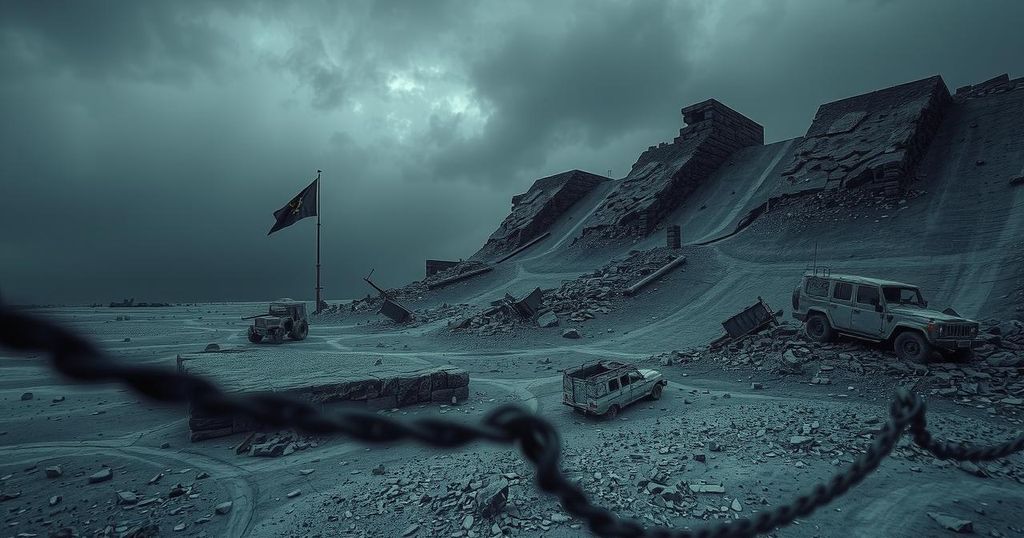Major General Peter Cirimwami Killed in M23 Rebel Assault in DRC

Major General Peter Cirimwami, military governor of North Kivu in the DRC, has died from injuries sustained during a frontline battle with M23 rebels. His death coincides with escalating violence as M23 encircles Goma, prompting international evacuation advisories for citizens. The UN reports significant displacement and worsening humanitarian conditions, underscoring the crisis facing the eastern DRC due to ongoing conflict.
The military governor of North Kivu province in the Democratic Republic of the Congo (DRC), Major General Peter Cirimwami, has succumbed to injuries sustained during an assault by M23 rebel forces. His death occurred amid escalating tensions as M23 fighters are advancing towards Goma, the provincial capital, posing a significant threat to regional stability. Cirimwami was actively involved in operations against the rebels and had been visiting front-line troops shortly before his death.
Local authorities confirmed the general’s death through unnamed government and military sources, underscoring the gravity of the conflict in North Kivu. Recent reports indicate that M23 has gained substantial control over surrounding territories, heightening fears for the safety of Goma’s two million residents. Panic arose within Goma following M23’s capture of Sake, a key town that connects to the capital, further isolating the city from government forces.
The United Nations has issued alarming warnings regarding the level of displacement caused by the ongoing conflict, which has affected over 400,000 people this year alone. UNHCR spokesperson Matthew Saltmarsh expressed hardships faced by those fleeing violence, highlighting deteriorating living conditions in refugee camps and the growing humanitarian crisis in the region. Many displaced individuals are seeking refuge in Goma, where conditions remain precarious.
In response to the escalating conflict, several Western nations, including the United States, United Kingdom, and France, have advised their citizens to evacuate Goma, urging them to leave while travel routes remain accessible. As anti-M23 sentiments grow in the region, witnesses like Mumulirwa Baguma Destin recount fears of forced recruitment by rebels, illustrating the dire situation faced by local populations amidst the chaos.
The M23 group has been implicated in numerous human rights abuses, driving millions from their homes since the renewal of hostilities three years ago. The DRC government, alongside the UN, accuses Rwanda of providing support to M23, though Rwanda has denied these assertions while revealing the presence of its forces in eastern DRC. The historical context of M23’s formation and the conflict’s roots speak to a long-standing struggle for power and resources in the mineral-rich eastern regions of the DRC. The threat posed by M23 continues to haunt survivors of previous offensives, many of whom fear a return to foreign occupation and violence in their communities.
The political instability in North Kivu province is rooted in a decades-long conflict in the eastern Democratic Republic of the Congo (DRC), where numerous armed groups compete for control over lucrative mineral resources. The M23, primarily composed of ethnic Tutsis, emerged following discontent within the Congolese army, leading to widespread violence and humanitarian crises. The involvement of neighboring Rwanda complicates these issues, with accusations of external military support contributing to tensions in the region and a continuous cycle of displacement and suffering for local populations. Understanding this background is crucial to grasping the implications of recent developments, such as the death of Major General Peter Cirimwami and the advances made by M23 rebel forces.
The death of Major General Peter Cirimwami marks a significant escalation in the ongoing conflict in North Kivu, as M23 rebels continue to encroach upon the provincial capital of Goma. With more than 400,000 individuals displaced this year alone and warnings from the United Nations regarding the worsening humanitarian crisis, international calls for evacuation highlight the urgency of the situation. This incident underscores the fragility of peace in the region and the dire need for effective interventions to address the violent unrest and protect vulnerable communities.
Original Source: www.aljazeera.com








